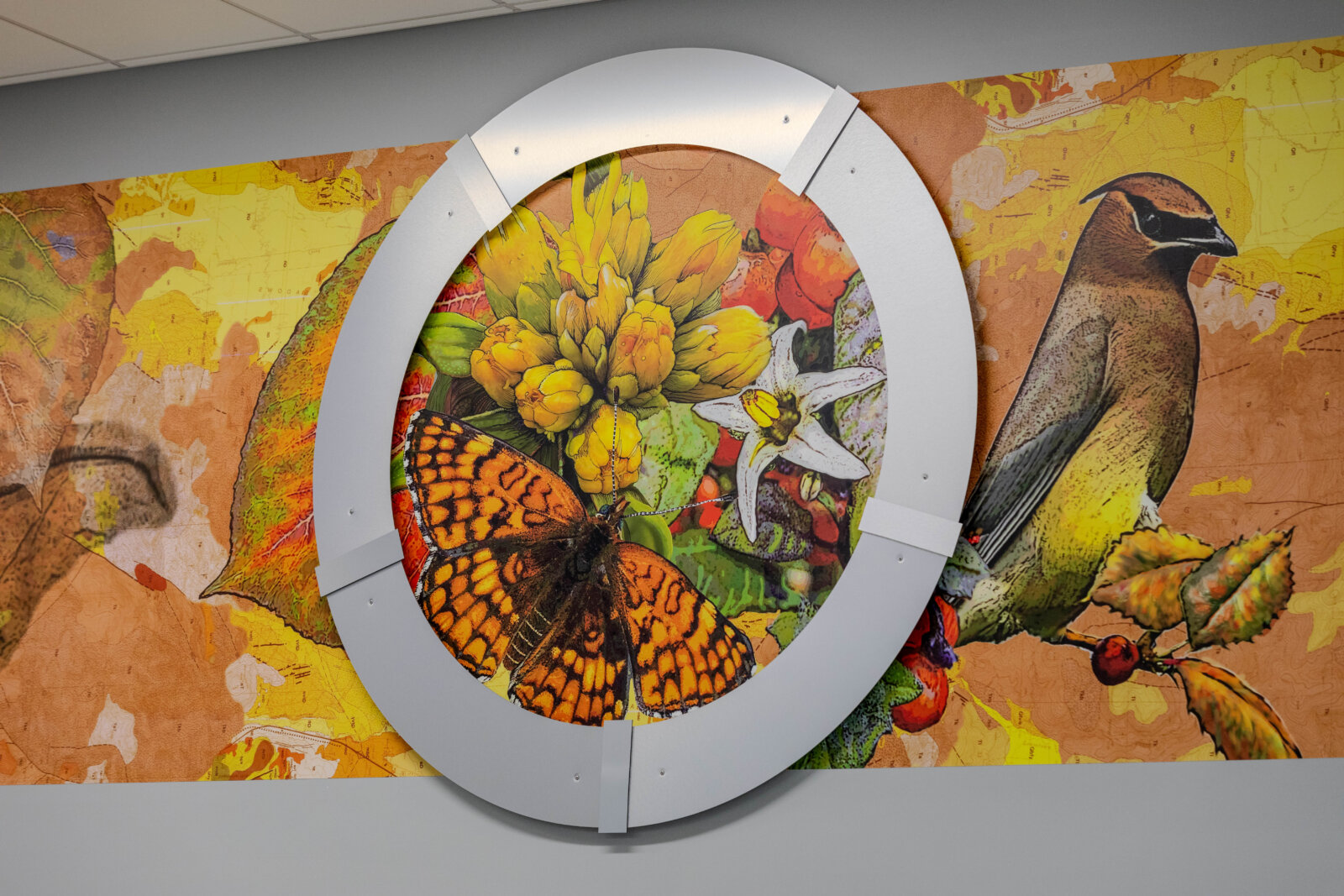
Repeated Refrains
Inspiration for Repeated Refrains
RNO’s first public art commission, Repeated Refrains, is a striking 450-foot installation that stretches the length of the Ticketing Hall.
This piece honors northern Nevada’s diverse landscapes, from dry deserts and wooded mountains to lush hillsides.
Brought to life by nationally acclaimed public artist Dixie Friend Gay, the artwork reflects her deep connection to the areas nature surroundings.
Walking Through Nature
To create an authentic tribute to the region, Dixie Friend Gay collaborated with a botanist to incorporate native flora and fauna throughout the piece.
The artwork’s background features interpretations of geological maps, ensuring a seamless flow between elements and evoking the experience of walking through nature, much like hiking in the area.
Gray curved lines throughout the piece represent movement and change.
Capturing the Seasons
Divided into four sections, the installation represents the changing seasons, highlighting the colors, plants, and wildlife unique to that time of year.
Symbolizing the Region’s Identity
Scattered throughout the piece, silver rings pay homage to Reno’s history as the “Divorce Capital of the World”. According to legend, newly divorced women would symbolically toss their wedding rings into the Truckee River after leaving the courthouse.
Other symbolic imagery throughout the piece, including historic maps, famous landscapes, and a quote from Mark Twain, all embody the area’s pioneer spirit.
Spring
In the spring section, a jackrabbit leaps through a forest of Aspen trees, while wild mustangs gallop across the desert, and the Snow Plant signals the end of winter. As the weather warms, native birds chirp, a variety of flora bloom, and a Vivid Dancer Damselfly, the state insect of Nevada, hovers to take flight.
Historical maps in this section highlight that Lake Tahoe was once called “Lake Bigler,” named in honor of John Bigler, California’s third governor. The lake was officially declared Lake Tahoe in 1945.
A quote from Mark Twain’s Innocents Abroad encourages travelers to broaden their perspective, embrace new experiences, and challenge prejudice. Twain, also known as Samuel Clemens, lived in Nevada from 1861 to 1864, during which time he resided in Virginia City and Carson City, where he adopted his famous pen name.
Summer
As spring slowly gives way to summer, Nevada’s state animal, the Desert Bighorn Sheep, makes an appearance. More unique plant life, including Menzie’s Fiddleneck, combine with an array of native butterflies, moths, and hummingbirds for a colorful display.
This section features the famous Black Rock Desert, home to the annual Burning Man festival. Held on the playa in Black Rock City since 1991, Burning Man attracts over 60,000 passengers who fly through RNO each year. The festival is known for its art installations, and, of course, the iconic burning of the man sculpture.
Fall
As autumn approaches, the weather cools and the colors deepen into darker hues. In this section, Nevada’s state fossil, the Ichthyosaur, is featured alongside a striking Stellar’s Jay. Among the dry desert plant life, a native bobcat and quail can be spotted. Beyond a cross-section of a native seed pod, the Tufa Domes of Pyramid Lake emerge. A coyote and Turkey Vulture endure the crisp fall chill.
Winter
Winter arrives under a bright Silver State sky. Rural Nevada is known for having some of the darkest skies in the country, offering some of the best stargazing spots.
A unique weather formation common to northern Nevada known as a lenticular cloud is portrayed alongside pogonip, a dense winter fog formed in the mountain valleys of the area. Despite the freezing temperature and challenging environment, native birds and a stag greet passengers through a mist of snowflakes.
RNO’s First Public Art Commission
Read more about this solicitation and artwork curation.
